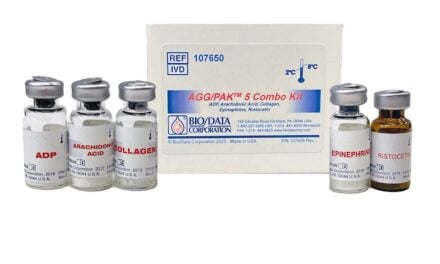Summary: A team from The University of Sydney repurposed COVID-19 rapid antigen tests for coagulation status evaluation using paper-based lateral flow assays combined with machine learning, addressing the need for rapid and cost-effective testing in cardiovascular care.
Takeaways:
- Innovative Repurposing: COVID-19 rapid antigen tests are adapted as paper-based lateral flow assays to measure blood coagulation status, utilizing machine learning for interpretation and leveraging post-pandemic resources.
- Immediate Adjustments: A mobile app prototype enables clinicians to perform real-time and precise anticoagulant dosing adjustments based on red blood cell diffusion patterns, improving treatment accuracy.
- Cost-effective and Rapid: This approach offers a smart, rapid, and cost-effective solution for coagulation management, enhancing clinical decision-making and optimizing patient outcomes in the post-pandemic era.
Addressing the pressing demand for rapid and inexpensive coagulation testing in cardiovascular care, a team led by Lining Arnold Ju from The University of Sydney, introduced a novel application of repurposed COVID-19 rapid antigen tests (RATs) as paper-based lateral flow assays (LFAs) combined with machine learning for coagulation status evaluation.
Immediate and Accurate Anticoagulant Dosing Adjustments
By further developing a mobile app prototype, they present a platform that enables clinicians to perform immediate and accurate anticoagulant dosing adjustments using existing post-pandemic resources. Their proof-of-concept employs a random forest machine learning classifier to interpret image feature variations on RAT NC membrane, correlating red blood cell (RBC) wicked diffusion distance in recalcified citrated whole blood with changes in coagulative viscosity, easily interpreted.
Enhanced by confocal imaging studies of paper microfluidics, their approach provides insights into the mechanisms dissecting coagulation components, achieving high classification precision, recall, and F1-scores. The inverse relationship between RBC wicked diffusion distance and enoxaparin concentration paves the way for machine learning to inform real-time dose prescription adjustments, aligning with individual patient profiles to optimize therapeutic outcomes.
This study not only demonstrates the potential of leveraging surplus RATs for coagulation management but also exemplifies a cost-effective, rapid, and smart strategy to enhance clinical decision-making in the post-pandemic era.
Repurposing COVID Rapid Antigen Tests
The innovative repurposing of widely available COVID-19 RATs for coagulability testing is a strategic and intelligent adaptation to the post-pandemic era’s abundance of resources and established infrastructure.
These LFAs, originally designed to detect viral proteins, have the potential to be modified for visualizing changes in fluid viscosities, thereby providing a direct measure of coagulation status. Such an adaptation is not only aligned with the urgent need for cost-saving measures in healthcare but also effectively utilizes the surplus supplies available to address a critical clinical demand.
The use of ACT, APTT, and PT in clinical settings underscores some of the challenges in accurately monitoring and managing anticoagulation therapies, which is compounded by variations due to blood draw site preference/suitability and different anticoagulants used.
Since its adaptation in the late 1960’s ACT is widely employed as a “gold standard”, requiring between 2–3 mL of blood, it is and utilized during cardiac surgeries, yet it demonstrates significant output variability depending on patient haematocrit levels, with devices like Hemochron showing positive biases of about 56 s during heparinization.
This variability is made more pronounced when considering that blood samples from various sites like arterial lines or central venous catheters often show no consistent correlation with low-dose heparin administration, as observed in ICU patients where ACT does not correlate well with UFH dosages, which causes concern for the efficacy of coagulation measurement for CVD treatment.
Featured image: Repurposed COVID-19 rapid antigen tests provide an ideal platform for observing differences in blood coagulability. Random Forest image classification algorithms can facilitate rapid coagulation status assessment on a paper-based LFA platform. Photo: Shanghai Jiao Tong University Journal Center





